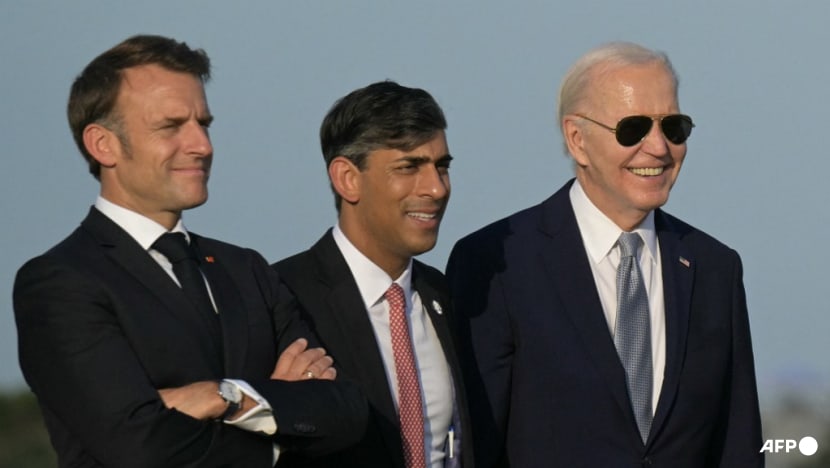Commentary: Democrats join 2024’s global graveyard of incumbents
Governments across the world are struggling in this period of economic and geopolitical turmoil, writes the Financial Times' John Burn-Murdoch.

Emmanuel Macron, Rishi Sunak and Joe Biden at the G7 Summit on Jun 13, 2024. The incumbents in every single one of the 10 major countries that held national elections in 2024 were given a kicking by voters. (File photo: AFP/Tiziana Fabi)
LONDON: At the time of writing, United States Vice President Kamala Harris has won almost four percentage points less of the popular vote than President Joe Biden did in 2020, the steepest drop in Democratic support since 1980.
What’s more, not only did Donald Trump retake the White House, the Republicans won a majority in the Senate and are likely to retain control of the House of Representatives.
Such a crushing defeat in this week’s US election is bound to elicit months if not years of soul-searching from Democrats. Did Biden hold on for too long? Should party officials have opted for a contested convention instead of parachuting Harris into the race? Has the party’s socially progressive turn alienated some Hispanic and Black men?
The problem is, it’s entirely possible both that the answer to all three of those questions is “yes”, and that taking action to address them would not have produced a fundamentally different outcome.
Just as the answer to “would Britain’s Conservatives have fared better in an autumn election in a lower inflation environment?” is “maybe”, but the response to “would it have resulted in a materially different outcome?” is “no”.
MOST HOSTILE ENVIRONMENT FOR INCUMBENTS
The reason I make these assertions is that the economic and geopolitical conditions of the past year or two have created arguably the most hostile environment in history for incumbent parties and politicians across the developed world.
From America’s Democrats to Britain’s Tories, Emmanuel’s Macron’s Ensemble coalition to Japan’s Liberal Democrats, even to Narendra Modi’s erstwhile dominant Bharatiya Janata Party, governing parties and leaders have undergone an unprecedented series of reversals this year.
The incumbents in every single one of the 10 major countries that have been tracked by the ParlGov global research project and held national elections in 2024 were given a kicking by voters.
This is the first time this has ever happened in almost 120 years of records.
Ultimately voters don’t distinguish between unpleasant things that their leaders and governments have direct control over, and those that are international phenomena resulting from supply-side disruptions caused by a global pandemic or the warmongering of an ageing autocrat halfway across the world.
Voters don’t like high prices, so they punished the Democrats for being in charge when inflation hit.
The cost of living was also the top issue in Britain’s July general election and has been front of mind in dozens of other countries for most of the last two years.
That different politicians, different parties, different policies and different rhetoric deployed in different countries have all met similar fortunes suggests that a large part of Tuesday’s (Nov 5) American result was locked in regardless of the messenger or the message.
The wide variety of places and people who swung towards Trump also suggests an outcome that was more inevitable than contingent.
But it’s not just about inflation.
THE MISERY INDEX
An update of economist Arthur Okun’s "misery index" - the sum of the inflation and unemployment rates - for this era might swap out joblessness and replace it with immigration.
On this basis, the past couple of years in the US, UK and dozens of other countries have been characterised by more economic and societal upheaval than they have seen in generations.
Of course, in the case of immigration, the distinction between unstoppable global forces and issues amenable to policy is a little fuzzier than with inflation. The rise of immigration around the world, both in numbers and salience, hints at a common global element, but clearly governments are not powerless here.
Biden, Harris and the Democrats are not blameless for Tuesday’s decisive defeat. Clearly there are lessons to be learnt.
But it’s possible there is just no set of policies or personas that can overcome the current global anti-incumbent wave.
















